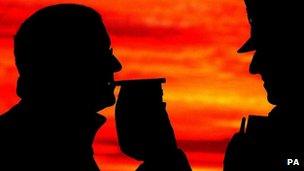Scottish drink-drive limit cut endorsed by MSPs
- Published
Plans to cut the drink-driving limit in Scotland have been endorsed by the Scottish Parliament, but amid concerns over whether they would work.
The SNP government wants to reduce the limit from 80 milligrams per 100ml of blood to 50 milligrams.
But Labour said the move could be undermined by justice system cuts, and the Tories claimed the wrong offenders could be targeted.
MSPs would need to pass new laws before the limit could be cut.
The plans were debated after powers to change the limit were devolved from Westminster to Holyrood, under the Scotland Act, external.
The UK government is not planning to lower the limit in the rest of the country, but Scottish Justice Secretary Kenny MacAskill said further action was needed to tackle drink-driving.
One in 10 of the deaths caused on Scotland's roads involves drivers who are over the current alcohol limit, while motorists are said to be five-times more likely to be involved in an accident while at the current limit of 80 milligrams, compared with 50.
Mr MacAskill said the current limit had been in force since the mid-60s, while Malta was the only other European country to have maintained an 80 milligram limit.
He told parliament: "The question has to be asked whether the current drink-drive limit is providing a sufficiently clear message that drinking and driving is unacceptable - we believe the current limit has had its day."
He added: "The time is right for a change that will bring Scotland in line with the vast majority of Europe.
"Our European neighbours have not lowered the drink-driving limits on a whim - they've taken this action to address problems with drink-drivers on their roads."
The Scottish government's consultation on drink-driving runs until the end of November, although Labour justice spokesman Lewis Macdonald said there was a "strong case" for early legislation to cut the limit.
He also said reductions like cutting civilian police staff "risked" officers being pulled from frontline duties, which would affect their ability to enforce the new law.
"You cannot make changes to the law without ensuring the justice system is fit to deliver those changes," he said.
"Proposed court closures across Scotland, budget cuts at the Scottish Court Service, falling numbers in the fiscal service - they must all have implications for any measures which will increase the number of cases brought to court."
For the Conservatives, Alex Johnstone said "a case may exist" for cutting the limit to deal with the "scourge" of drink-driving, but argued the focus of the police may change as a result.
He told MSPs: "I believe the right place for the police to be enforcing the law is on our streets on a Friday or Saturday evening, when those who have consumed a large amount of alcohol mistakenly get behind the wheel of a car to the risk of the public.

Scottish ministers want to bring drink-drive limits in to line with many other European countries
"A lower limit may raise the spectre that the most productive place to enforce the drink-driving limit might be in a supermarket car park on a Sunday morning, where the hard-working mother who had one glass of of wine too many after she got the kids to bed on a Saturday night may still find herself slightly above that lower limit on the Sunday morning."
Alison McInnes, the Liberal Democrat justice spokeswoman, hit out at the Labour and Tory concerns, adding: "The Scottish Liberal Democrats are content to offer our support.
"We look forward to the results of the government's consultation being published and the reduced limit being introduced in parliament."
A motion backing the Scottish government's consultation on cutting the limit was passed in parliament by 100 votes to 12.
Meanwhile, UK Roads Minister Stephen Hammond said the Westminster government remained committed to tackling drink-driving.
He added: "Improving enforcement of existing measures is likely to have most impact on the dangerous people who drink and drive, and will therefore be the most effective use of scarce resources, rather than lowering the prescribed alcohol limit for driving."
Mr MacAskill has asked the UK government for further devolved powers which would give Scotland the legal ability to introduce random drink-drive tests, set different limits based on a driver's age and experience and change the penalties for being caught.
- Published27 May 2012
- Published1 May 2012
- Published24 May 2012
- Published18 April 2012